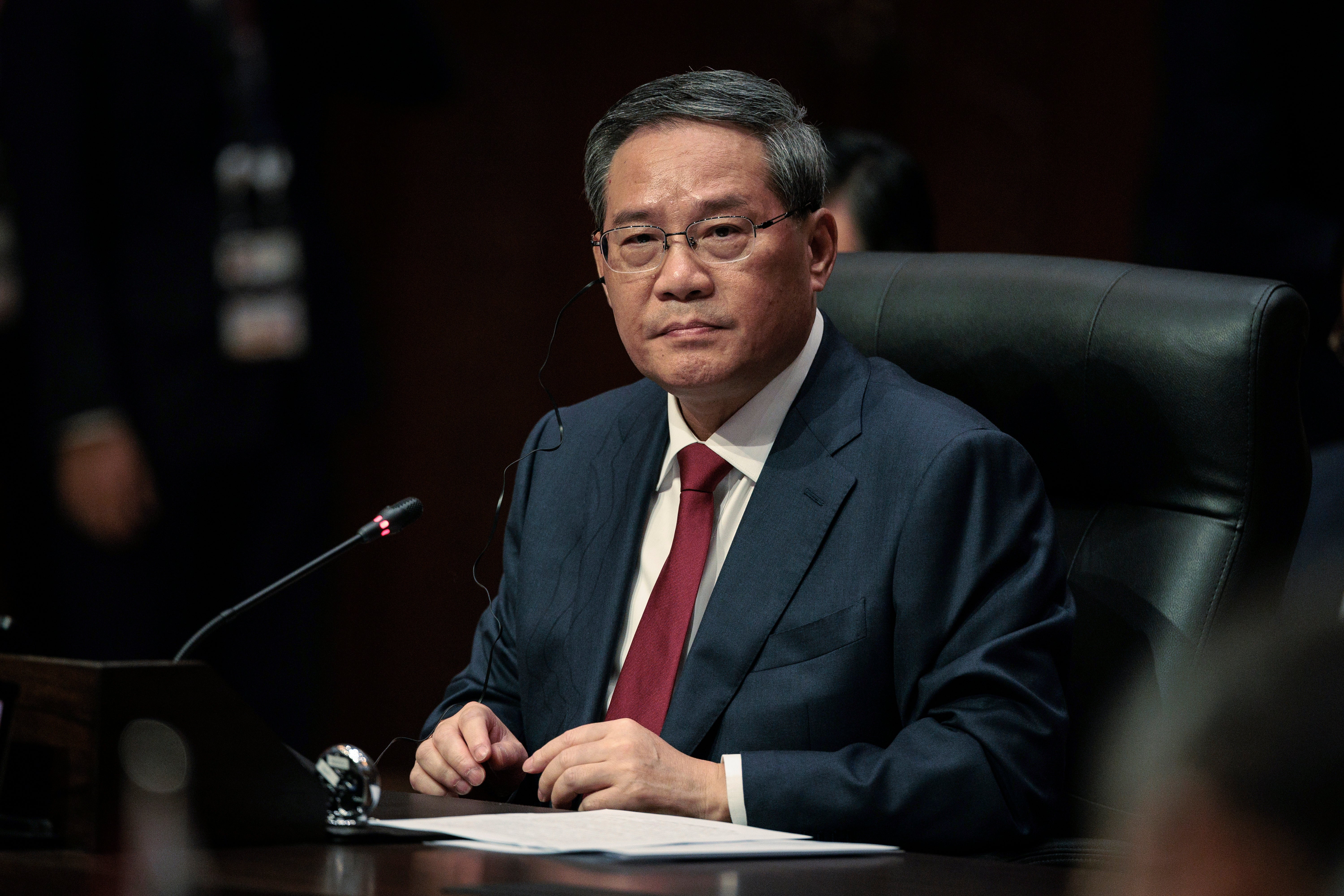Sunak tackles Chinese premier in person over ‘spy in Parliament’ arrest
At the G20 meeting in India, the PM warned Li Qiang over ‘unacceptable’ meddling in the UK’s democracy

Rishi Sunak has confronted the Chinese premier, Li Qiang, over “unacceptable” interference in Britian’s democracy, after the arrest of a parliamentary researcher suspected of spying for Beijing.
The pair exchanged words on the sidelines of the G20 meeting in India, with the prime minister bringing up the case of the parliamentary researcher who has had links to several senior Conservative MPs.
After the meeting, Mr Sunak said he had raised his “very strong concerns about any interference in our parliamentary democracy, which is obviously unacceptable”.
With calls growing from senior Tories for officials to name the suspected spy, it emerged the MPs he had links to included security minister Tom Tugendhat and foreign affairs committee chairperson Alicia Kearns.
The Briton was arrested along with another man by officers on 13 March. Officers from the Metropolitan Police’s Counter Terrorism Command, which oversees espionage-related offences, are investigating.
A Downing Street spokesman confirmed the meeting, saying: “The prime minister met Premier Li Qiang and conveyed his significant concerns about Chinese interference the UK’s parliamentary democracy.”
The PM told reporters he “raised a range of different concerns that we have in areas of disagreement”.
“And, actually, I think the right thing to do is take the opportunity to engage to raise concerns specifically,” he said, “rather than just shouting from the sidelines.”
Mr Sunak insisted it is the “right approach” to be “in the room talking to the Chinese directly about those, face to face” as he defended foreign secretary James Cleverly's recent visit to China.
"There's no point carping from the sidelines – I'd rather be in there directly expressing my concerns, and that's what I did today," he added.
Former Tory leader Sir Iain Duncan Smith, an outspoken China critic, told The Independent the individual was “trying to undermine anybody who was concerned about China”.
As well as undermining critics of the ruling Communist Party, the individual would likely “feedback any information they get”, Sir Iain added.
The senior MP has repeatedly called on ministers to adopt a more sceptical approach to China. “They see us kind of desperately wanting to engage with them, and they only ever treat through strength,” he warned.
And Sir Iain criticised Britain’s attempts to engage with China, adding: “It’s not a dialogue, it’s a monologue, they’re not listening.
“They just stand there, they treat us like dirt.” He said the individual should be named by security services.
Justice secretary Alex Chalk said the arrest – first reported in The Sunday Times – is “extremely serious” and “lessons will be learned” by the parliamentary authorities about how the suspected spy was handed a commons pass.
He told Sky News: “There is a rigorous approach that is taken in terms of being provided with parliamentary passes, but plainly this has got to play through in terms of this investigation, and whatever lessons need to be learned by the parliamentary authorities, I’m sure will be learned.
“But it is important to take it in stages.”
Mr Chalk also said China is an “epoch-defining challenge” which Britain can’t “wish away”. The justice secretary corrected himself, having at first referred to the country as a “threat”.
“China is the world’s second-biggest economy. If we are going to meet the challenge of climate change, we can’t do it without China,” Mr Chalk added.
And he said ministers will “raise matters with the Chinese that are of concern to us”, but having “no engagement” with the Chinese is not practical.
Senior Tory MP Caroline Nokes called for a review of parliamentary passes in the wake of the arrest.
She said it was “a very timely reminder to colleagues to be careful who you're employing, who you're speaking to, and indeed to government and the parliamentary authorities to do your vetting”.
Ms Nokes told Times Radio: “We need them to be looking at what passes have been issued, the current now, and making sure that those who shouldn't have them don't.”
The Inter-Parliamentary Alliance on China (IPAC), which advocates a more sceptical approach to the country, said it was “appalled” at reports of “the infiltration of the UK parliament by someone allegedly acting on behalf of the People’s Republic of China (PRC)”.
“This case adds sad urgency to our call. Lessons must be learned about the severity of the threat posed by China and security weaknesses remedied,” the co-chairs of IPAC said.
It said the person was “hostile to IPAC’s work” and called on the authorities to name them “to avoid casting a wide web of suspicion”.
“This is not the first time government authorities have failed to proactively alert parliamentarians and other potential targets of suspected foreign interference threats linked to the PRC,” IPAC said.
Shadow home secretary Yvette Cooper said reports about the spy were “immensely serious” and show “why the UK needs a much more comprehensive response to national security threats and challenges from China and other countries”.
“Despite repeated warnings to ministers about growing threats, the Conservative government has failed to act. They are not taking this issue seriously enough,” she said.
Ms Cooper added that Britain needs to upgrade its response to state threats and promised a strategy to address them if Labour wins power.
A report from Parliament’s spy agency watchdog, the Intelligence and Security Committee, warned in July that Beijing is targeting the UK “prolifically and aggressively”.
Last year, MI5 issued a rare security alert, warning MPs that a suspected Chinese spy called Christine Lee had engaged in "political interference activities" on behalf of China’s ruling communist regime.
Labour MP Barry Gardiner, the former chairman of the now-disbanded Chinese in Britain APPG, received more than £500,000 in donations from her before the warning.
Join our commenting forum
Join thought-provoking conversations, follow other Independent readers and see their replies
Comments



Bookmark popover
Removed from bookmarks